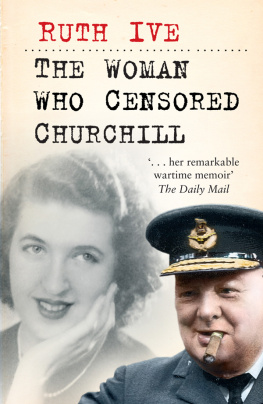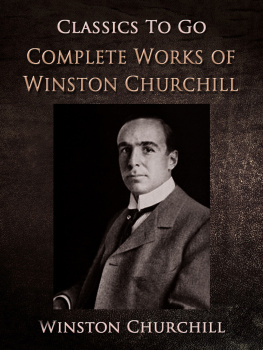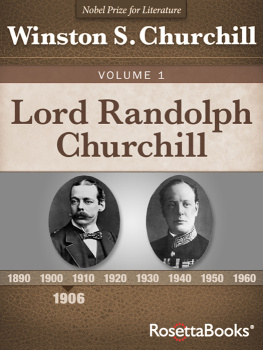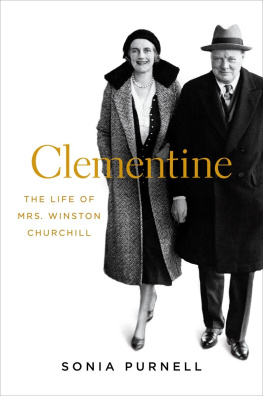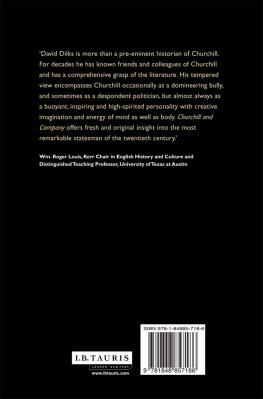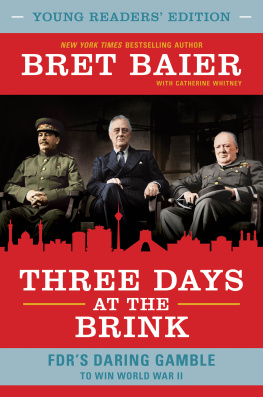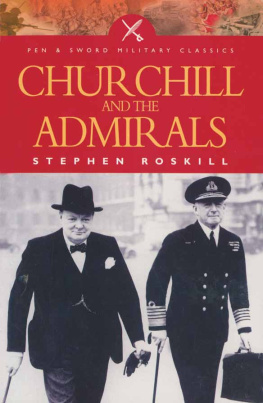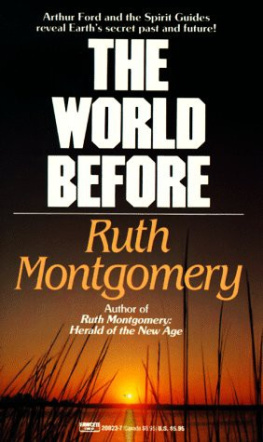Ruth Ive - The Woman Who Censored Churchill
Here you can read online Ruth Ive - The Woman Who Censored Churchill full text of the book (entire story) in english for free. Download pdf and epub, get meaning, cover and reviews about this ebook. year: 2010, publisher: The History Press, genre: Non-fiction. Description of the work, (preface) as well as reviews are available. Best literature library LitArk.com created for fans of good reading and offers a wide selection of genres:
Romance novel
Science fiction
Adventure
Detective
Science
History
Home and family
Prose
Art
Politics
Computer
Non-fiction
Religion
Business
Children
Humor
Choose a favorite category and find really read worthwhile books. Enjoy immersion in the world of imagination, feel the emotions of the characters or learn something new for yourself, make an fascinating discovery.
- Book:The Woman Who Censored Churchill
- Author:
- Publisher:The History Press
- Genre:
- Year:2010
- Rating:5 / 5
- Favourites:Add to favourites
- Your mark:
- 100
- 1
- 2
- 3
- 4
- 5
The Woman Who Censored Churchill: summary, description and annotation
We offer to read an annotation, description, summary or preface (depends on what the author of the book "The Woman Who Censored Churchill" wrote himself). If you haven't found the necessary information about the book — write in the comments, we will try to find it.
The Woman Who Censored Churchill — read online for free the complete book (whole text) full work
Below is the text of the book, divided by pages. System saving the place of the last page read, allows you to conveniently read the book "The Woman Who Censored Churchill" online for free, without having to search again every time where you left off. Put a bookmark, and you can go to the page where you finished reading at any time.
Font size:
Interval:
Bookmark:


Dedicated to David and Martin
and remembering the many thousands
of Londoners who perished
between 1940 and 1945

Disclaimer: This work is based on the authors recollection and every effort has been made to remain true to her experiences of the time. The publishers and the author have made every effort to clear permission for all images and documents reproduced within the work. However, we apologise for any erroneous use of copyrighted material and would welcome contact from the original copyright holder.
First published 2008
This edition published 2021
The History Press
97 St Georges Place, Cheltenham,
Gloucestershire, GL50 3QB
www.thehistorypress.co.uk
Reprinted 2016
Ruth Ive, 2008, 2010, 2021
The right of Ruth Ive to be identified as the Author of this work has been asserted in accordance with the Copyright, Designs and Patents Act 1988.
All rights reserved. No part of this book may be reprinted or reproduced or utilised in any form or by any electronic, mechanical or other means, now known or hereafter invented, including photocopying and recording, or in any information storage or retrieval system, without the permission in writing from the Publishers.
British Library Cataloguing in Publication Data.
A catalogue record for this book is available from the British Library.
ISBN 978 0 7524 6094 9
Typesetting and origination by The History Press
Printed and bound in Great Britain by TJ Books Limited, Padstow, Cornwall.
eBook converted by Geethik Technologies

Around 1988, I thought that as more official documents were being released into the Public Domain, it was time for me to tell and write about the important role played by MI9, known publicly as The Postal and Telegraph Censorship. This included in its various remits the Transatlantic Radio Line which operated between this country, America, Canada and, for a short period, Cairo from 19411945. It had been rumoured for some years that this hotline radio link between Churchill and Roosevelt existed but, in spite of the speculation and some highly coloured rumours, no accurate account of its existence has been recorded. I believed that a personal glimpse of our wartime leaders, including their characters and work styles, would be of historic interest and would reveal the everyday realities of listening in to history.
I had just retired from my job with a radio and television news agency and, after twenty-six years, I missed the discipline of a work routine. This, I thought, would be an interesting short-term hobby to fill my retirement days. How wrong I could be! By 2005, the long trail to find the true history of wireless and telegraphic interceptions and the technology that accompanied it was finally revealed, and I could truly declare mission accomplished.
Ruth Magnus Ive
2008
Although I had spent three and a half years listening to a terrible war being planned, organised and executed, listening in to the voices of Winston Churchill, Franklin Roosevelt and all the major statesmen and characters of that era, unbelievable as it may seem now, when I left my job as Censor on the Transatlantic Link in the Radio Department of the Postal and Telegraph Censorship, I was so quickly immersed into the life of an ordinary suburban housewife that I almost forgot the historical implications of my wartime work. The past became so deeply buried and seemed quite unreal when contrasted with my own rather ordinary domestic life, but nevertheless, when I watched old films and newsreels, read the War memoirs of the famous, I began to realise that I too had a story to tell of those extraordinary war years. So many of us, in our teens and early twenties when the War started, experienced that incredible division in our lives.
Even now it makes me shudder to think of instant decisions I had to make and the responsibilities I had to shoulder. I can only suppose it was the insouciance of youth that got me through.
The vow of silence imposed by the Official Secrets Act doesnt exactly encourage chatter, and I wanted to play the game according to the rules, so only my family and a few friends knew about my wartime work. While reading those biographies and memoirs of the famous, I became aware that if the Transatlantic Radio Service was referred to at all, it was described either inaccurately or imprecisely, and I thought it would be of interest to many people for me to recall an account of the happenings of the Department.
So after various skirmishes with Government Departments in an effort to free myself from the Official Secrets Act, I am now able to reveal the activities of one of the least known secret communication channels of the War.
In fact, I had started to give short talks to private clubs when BBC Radio approached me to do a broadcast. To try to recapture something of that particular wartime atmosphere, I returned to look at the building where I worked in St Martins Le Grande in the City of London virtually under the shadow of St Pauls Cathedral, and to my surprise, found the exterior of the building little changed, just forty-five years more dirt on its stonework, the wartime wire netting on the doors and windows still in place.
I pushed open the door and found a lone civil servant messenger sitting at a desk in the entrance hall who told me when I said I had worked in this building during the War, how lucky I was to come in now for the building was just about to be pulled down. I told Cathy Drysdale, my BBC producer, of Union Houses imminent fate and she promptly decided that the talk would have far more bite to it if it was made in situ, so she set about gaining permission from the landlord.
I assumed that the building was still owned by the Post Office who had bequeathed it to British Telecom, but they told Cathy they had just sold to a Japanese bank, while they in turn told her of the sale of Union House to a property company. However, the property company was both sympathetic and interested and immediately gave their permission for the broadcast to be done there.
On one very cold and windy January day, Cathy Drysdale, June Knox Mawer and myself, plus recorder, microphones and assorted pieces of equipment, unlocked the doors of the now completely empty Union House. There was no electricity laid on, so by the light of a torch, we found and pushed open the creaking ground-floor door to the old Operations room and entered.
I could scarcely believe my eyes the place hadnt changed since I walked out in July 1945. True, somebody had taken down those old trestle tables, removed the desks and emptied those always-full ashtrays, and then just left the place. Even the Colonels partitioned office was still there, that old brown Ministry of Works lino was still on the floor, those dreadful early florescent tube lights that always emitted a shrill buzz, all preserved under layers of dust and dirt.
I was completely shattered, and worst of all for a broadcast, rendered practically speechless. It seemed incredible that the building could have survived it only just survived in the Blitz when a parachute mine dropped on Armour House next door damaging our roof, but it got patched up and our Censorship Departments only occupied the ground floor. It also escaped redevelopment and refurbishment and all the other things they do to buildings these days.
Font size:
Interval:
Bookmark:
Similar books «The Woman Who Censored Churchill»
Look at similar books to The Woman Who Censored Churchill. We have selected literature similar in name and meaning in the hope of providing readers with more options to find new, interesting, not yet read works.
Discussion, reviews of the book The Woman Who Censored Churchill and just readers' own opinions. Leave your comments, write what you think about the work, its meaning or the main characters. Specify what exactly you liked and what you didn't like, and why you think so.

